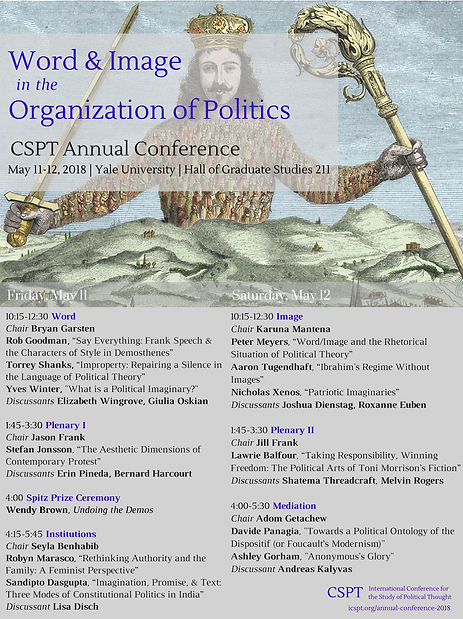Annual Conference 2018: Word & Image in the Organization of Politics
The International Conference for the Study of Political Thought was founded fifty years ago, in Toronto in December 1967, with a mission to continue the “humanist tradition or style in the analysis of politics” in the face of the behavioral revolution in the social sciences. At the first CSPT/NOMOS luncheon at APSA the following September, Sheldon Wolin delivered his famous lecture, “Political Theory as a Vocation.” That lecture marked a wide-ranging worry, succinctly and sharply expressed in CSPT’s mission statement, that “the study of politics, if reduced to a science of behavior, leaves to the demagogues and ideologues that all-important area where ethics and politics converge in the discussion of purposes and goals.”
CSPT’s 2018 Annual Conference marks the organization’s 50th anniversary by considering again what the humanist tradition or style is and what it can contribute to the analysis of politics today. Behavioral and formal approaches to the study of politics continue to challenge the value and coherence of humanistic approaches. Moreover, fundamental aspects of political life – its modes of political speech, its institutional forms (political parties, legislatures, constitutions), its aspiration to critical debate – seem to be continually interrupted by revolutions in communications and social media. The conference will take a historical perspective on these changes by exploring how modes of mediation including, most recently, the fast and frequent sharing of words and images, shape and transform political life.
In recent decades critical scholarship in the humanities has drawn attention to the politics of meaning and representation. In this conference we would like to explore more closely how words, texts, images, and institutions function as modes of political mediation. How can forms of discourse and communication and habits of social interaction structure the practice of politics? How might they influence the dynamics of political competition, mobilization, and protest? How might they affect the mutuality and conflicts of citizenship, the making of peoples and publics, masses and classes?
All events will be held in the Hall of Graduate Studies (320 York St.), Room 211
Schedule here.
Conference papers available here.




